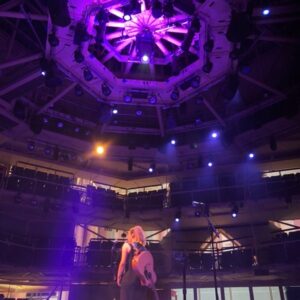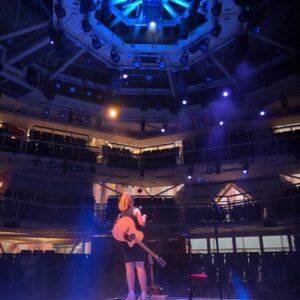On the Bruntwood Prize readers 2019
UPDATED: 17TH JUNE with new reader stats on taking on greater numbers of readers for the record 2019 entries All plays are submitted anonymously to…
Alexandra Faye Braithwaite is a Sound Designer and Composer currently working on BLOODY ELLE at the Royal Exchange Manchester and HOME I’M DARLING on tour at Stephen Joseph Theatre, Octagon Theatre Bolton & Theatre by the Lake. She is also a reader for the Bruntwood Prize. As BLOODY ELLE closes we’re checked in with her on how sound designers work with new writing….
Heart-warming and belly-achingly funny, BLOODY ELLE is stuffed full of those stomach-flipping-time-stopping moments, a touch, a glance, a kiss, that everyone will recognise. Set to an original score, building loops and layers of sound that make you feel like there is a ten-piece band on stage, BLOODY ELLE will make you feel you’ve been transported into a sweaty, packed out gig in the back of a pub or a 10,000 seat arena.
Pay what you can tickets are available for the stream on 2.30pm/7.30pm on Saturday 17th July
As a sound artist what do you look for as you read a script?
When I first talk about a project, or read a script, I’m looking for the heart. When all is stripped away, what are we left looking at? What are the questions that might never be resolved, what are the thoughts and feelings that are left tangled up together, and what are the things left unspoken. Sound is a language. Sometimes it sits underneath a story and digs subtly into an audience creating more space to think and feel, sometimes it disrupts and interrupts setting up parallel experiences or complex questions, and sometimes it softly speaks to us when there are no words, or not enough. Sometimes it’s the absence of sound, the silences providing respite or gaping holes that can’t be filled. As a sound artist, my language has to co-exist with all of this humanness, all of this complexity. It’s so important for me to approach each project with openness and curiosity, so that I can pick away at what it needs, and how it’ll work with the work of the rest of the team’s ideas, and how we inform each other in this. For me, I’m not only interested in one form, or a particular style, but what pulls me in is if I understand why this is being made now. If I sense that it’s stretching to articulate something important, if it’s authentic and brave, if it’s messy and complicated. And if I don’t quite know how to do it – that always makes me want to do it more! There’s a huge part of my job that is technical and relies on craft, but in the initial stages, I’m working with my instincts, relying on gut, and trusting myself and those around me that we will arrive somewhere together.
When I’ve read a script – if that’s the starting point – I always want to talk to the writer. In many ways, they are my closest collaborator. If I can understand where the piece came from, the drive behind the action and the necessity to speak this out loud, I can start composing or building layers of sound that I hope are connected to the heart behind it all. And it’s very similar in some ways – they write words, I write notes and beats. In order to write, I have to feel, and so sometimes that comes quickly, especially if I naturally connect to the piece in terms of my experiences, and sometimes I have to be patient, let it all sink in, and then translate it in someway. This can be scary, and I’ve had to learn to be patient and not panic. It might be in the shower, or playing FIFA that something starts to make sense to me, and that’s ok! When I know I’m making a piece, it just sort of sits there at all times, which is also something I’ve had to manage whilst doing multiple projects…it can be a bit much! In the early stages, I’ll sit down with a piano, or a synth, or another instrument that seems to make sense, and try to not think too much, allow myself to be free and let something out. It might just be a drum beat, or a melody line, or sometimes can be much more coherent. It’s often messy, and not fully-formed, but I find these early compositions tend to inform the process going forwards. Sometimes it’s a case of that going straight into the show, or might be I lift a tiny element of it, and build everything else around it. But I always trust something in it, because it was from the moment I was responding to the piece initially, without looking for answers or practicalities of how to solve things. Then it’s about the crafting of the music and sound into what is being made. The design, direction, movement and lighting all inform how this works, where when etc and the most exciting processes are where we are all responding to each other and what is happening collectively.
Tell us a little about your work on new plays and how your artistry influences the realisation of new work for the first time
Working with new plays is amazing. In some ways, it’s the purest form of what we do, as we’re not looking to interpret or translate, but to make the best version of this new thing and give it life. There’s a responsibility attached to that, that I’m really aware of. Because it’s new and never been seen before, and because theatre isn’t tangible, none of us know if it’s going to work for sure. You hope it will, you believe it will, but you’re all taking a leap into the unknown. But if the writer is part of the process, and if the director is working with them and refining things in the room, it’s really exhilarating from a sound point of view. Sometimes, I can make an offer that will see an entire scene cut, or a new scene written. Sometimes I can provide a sound moment that solves, in a different language, a sticking point that we couldn’t see past on the page. It’s a dramaturgical process, and I love working like this. I have to be really flexible, open to last minute changes and listening really deeply to what is needed. But these are usually the spaces that I feel I can really contribute to, and not that sound is an add on or last minute thought.


Tell us a little bit about the journey of taking Bloody Elle from page to stage
Working on BLOODY ELLE has been a really interesting challenge and an amazing journey. More often than not, I am Sound Designer and Composer on the projects that I’m working on, but one big difference here, is that Lauryn had written all of the songs already as part of the script-writing process. So a big part of my role was to work out what each song needed, and then what other textures the rest of the piece needed. We identified at least four songs, that were huge turning points in the show, and that would need additional composition. So me and Lauryn spent some time in my studio in Stockport, got them recorded in acoustic form, and then I wrote multiple instrument lines to really let them explode into big musical numbers. We are very different in terms of our styles as composers, but this worked so well together. Lauryn brings incredible melodies and a real story-telling vibe, and I naturally lean towards moody synths, and punching bass lines! But this combination meant we could get to a really interesting place that wouldn’t have been possible without each other. Watching the show now, I love the moments where Elle (played by Lauryn) gets completely knocked off her feet by the strength of what she is feeling in a moment, and the music comes in and sweeps her up and away, breaking all of the rules of her starting loops or picking up her guitar. It’s also been really brilliant playing with all of the different possibilities in how we present the songs. Which ones are acoustic and really stripped back, which one needs loop and effects pedals, which are on head mic or standing mics, which should be huge numbers that she sings along to etc. We wanted to make sure there was as much variety as possible and the audience never got used to a rhythm but were experiencing different textures and tones all the time.
The other side of job aside from composing on BLOODY ELLE, was the sound and system design work. From the outside it may, and should, seem quite simple and seamless, but there is a lot of technical elements to work out! For example, when Lauryn starts something on guitar or mic that I will then add to, she needs a click in her ear to make sure we’ll be in time with each other. In other places, the sound is underscoring big passages of text and they are timed to the millisecond, so again we need to find a way that Lauryn can get count-ins so we can keep together. Also, microphones play a huge role, and it has to be so precise in order for it to sound consistent, not jar, and for her to always be heard above whatever sound is happening in a moment. Adjustments by one decimal were being made throughout tech, and then of course it changes when there’s an audience so you have to make tweaks. Beyond this its also trying to push where the sound is coming from, should it be far away and distant, should it be close and intimate?
Lastly, working at the Royal Exchange presents some really unique challenges and opportunities. I’ve made three pieces (Light Falls, Wuthering Heights and Bloody Elle) in that space now, and each time I find new things and possibilities. I love working with putting speakers in the hall and playing sound through them, as it creates such a feeling of being surrounded by sound when you’re in the theatre and the natural reverb of the hall is incredible. The front of house staff must hate me though, so huge apologies to them! But I find thinking of the space, as the whole hall really exciting, and again, you just have more dynamics to play with.
How was reading for the 2019 Bruntwood Prize for Playwriting?
I feel very honoured to read for the Bruntwood, it’s such a privilege to be allowed to dive into writers heads and adventures for the first time, knowing not many people have. And for me, storytelling is how I learn and grown and try to be better everyday.
Comments
Add comment